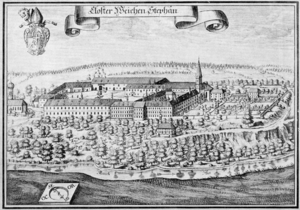
Wheat beer is a top-fermented beer which is brewed with a large proportion of wheat relative to the amount of malted barley. The two main varieties are German Weizenbier and Belgian witbier; other types include Lambic, Berliner Weisse, and Gose.
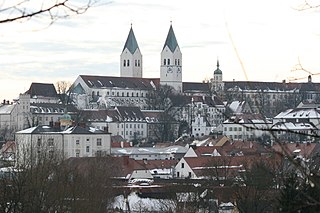
Freising is a university town in Bavaria, Germany, and the capital of the Freising Landkreis (district), with a population of about 50,000.

Weihenstephan is a part of Freising north of Munich, Germany. It is located on the Weihenstephan Hill, named after the Weihenstephan Abbey, in the west of the city.

Dunkel, or Dunkles, is a word used for several types of dark German lager. Dunkel is the German word meaning dark, and dunkel beers typically range in color from amber to dark reddish brown. They are characterized by their smooth malty flavor. In informal terms, such as when ordering at a bar, "dunkel" is likely to mean whatever dark beer the bar has on tap, or sells most of; in much of north and western Germany, especially near Düsseldorf, this may be Altbier.

Tyskie is a Polish brand of beer. Its name comes from the brewery located in the Upper Silesian town of Tychy. It is brewed by the Tychy Princely Brewery, part of the Kompania Piwowarska brewery group, which was acquired by Asahi Group Holdings in 2017.

Beer is a major part of German culture. German beer is brewed according to the Reinheitsgebot, which permits only water, hops, and malt as ingredients; and stipulates that beers not exclusively using barley-malt, such as wheat beer, must be top-fermented.

G. Schneider & Sohn is a weissbier brewing company in Bavaria, Germany.
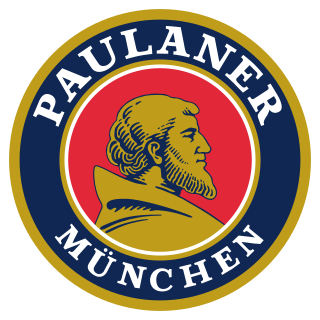
Paulaner is a German brewery, established in 1634 in Munich by the Minim friars of the Neudeck ob der Au cloister. The mendicant order and the brewery are named after Francis of Paola, the founder of the order. Paulaner is one of the six breweries who provide beer for Oktoberfest. Paulaner ranks number six among Germany's best-selling beers.
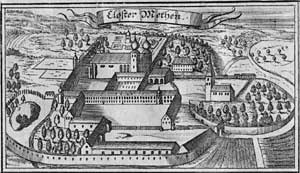
Metten Abbey, or St. Michael's Abbey at Metten is a house of the Benedictine Order in Metten near Deggendorf, situated between the fringes of the Bavarian Forest and the valley of the Danube, in Bavaria in Germany.

Rinchnach Priory was a Benedictine monastery at Rinchnach in Bavaria, Germany.

Niederaltaich Abbey is a house of the Benedictine Order founded in 741, situated in the village of Niederalteich on the Danube in Bavaria.

Benediktbeuern Abbey is a monastery of the Salesians of Don Bosco, originally a monastery of the Benedictine Order, in Benediktbeuern in Bavaria, near the Kochelsee, 64 km south-south-west of Munich. It is the home of the Songs from Beuern, i.e., the famous Carmina Burana.
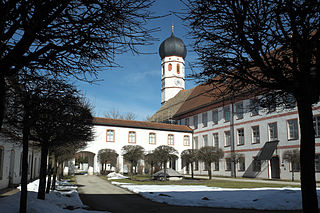
Beuerberg Abbey, formerly a monastery of the Augustinian Canons, is now the Monastery of the Visitation, Beuerberg, a community of the Visitandines in Eurasburg in Bavaria, Germany.
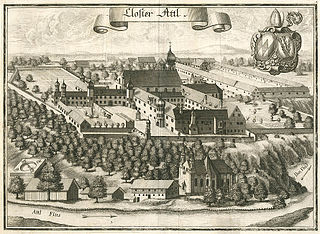
Attel Abbey, also Attl Abbey, was a Benedictine monastery, later a home for the disabled run by the Brothers Hospitallers, in the village of Attel near Wasserburg am Inn in Bavaria, Germany.

Weltenburg Abbey is a Benedictine monastery in Weltenburg near Kelheim on the Danube in Bavaria, Germany.
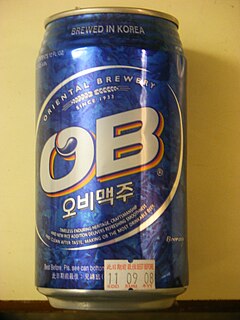
Oriental Brewery or OB is a South Korean brewery currently owned by AB InBev, and initially founded by Doosan Group.

Isen Abbey was a Benedictine abbey, later a collegiate foundation, at Isen in Bavaria, Germany.
Heineken N.V. is a Dutch brewer which owns a worldwide portfolio of over 170 beer brands, mainly pale lager, though some other beer styles are produced. The two largest brands are Heineken and Tecate; though the portfolio includes Amstel, Fosters, Sagres, Cruzcampo, Skopsko, Affligem, Żywiec, Starobrno, Zagorka, Zlatý Bažant, Laško and Birra Moretti.

The Bayerische Staatsbrauerei Weihenstephan is a German brewery located on the site of the former Weihenstephan Abbey in Freising, Bavaria. In 2014, the total output was 382,341 hectolitres (325,819 US bbl). The brewery advertises itself as "The World's Oldest Brewery".

The Aldersbach brewery is a traditional medium-sized brewery in Aldersbach, Lower Bavaria, opened in the 13th century. It produces beer types such as Dunkel, Helles, and Pilsner, plus seasonal Bock and Pale lagers. In 2016, it won awards from the Bavarian Brewers Association and the Bavarian State Beer Exhibition.
